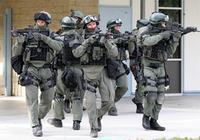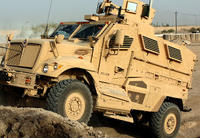-
U.S. cancels final phase of European missile defense system

Faced with sequestration-imposed budget cuts, the Pentagon cancels the fourth and final phase of the U.S. European missile defense system. The money made available by the decision would be used to fund the deployment of fourteen additional missile interceptors in Alaska to increase U.S. defense against North Korea’s missile threat. The Pentagon said that the first three phases of the defensive missile deployment in Europe, when completed in 2018, would provide coverage of all of NATO members.
-
-
Fighting gun restrictions on the international scene

The National Rifle Association (NRA) has taken its campaign against measures aiming to tighten gun control to the international level. The organization has been leading a campaign fight a UN treaty designed to restrict the flow of arms to conflict zones. The treaty is likely to pass, but the NRA appears to have enough support in the Senate to prevent ratification.
-
-
Was Mexican border firefight killing 40 real?
It would seem that drug violence only stops at the Mexican border in the imaginations of Washington politicians. On example: Mexican journalists, because of fear for their own lives and the safety of their families, are increasingly reluctant to cover drug cartels’ violence and mayhem. What has occurred in recent months is that American reporters located in American border cities also have stopped reporting on drug-related violence across the border for the same reasons as their Mexican counterparts.
-
-
U.S. to bolster missile defense to meet North Korean threat
The United States is bolstering the country’s missile defense after a series of explicit nuclear threats from North Korea. The Pentagon will announce Monday that it is deploying fourteen additional ground-based interceptors at missile silos in Alaska and California.
-
-
Questions raised about Iron Dome success
MIT professor Ted Postol is at it again: in 1992 he successfully challenged the claims made by the United States, Israel, and Raytheon about the effectiveness of the Patriot missiles in intercepting Iraqi SCUD missiles fired at Israel, and now he is raising similar questions about the accuracy of claims made about the effectiveness of Israel’s Iron Dome anti-rocket system during the 10-day Israel-Hamas war last November, a war code-named Pillar of Defense.
-
-
Gun manufacturers take action against states which passed tough gun laws
Gun manufacturers are starting to push back against strict gun laws in some states by refusing to sell their products to law enforcement agencies in these states, or to employees of these agencies. So far, more than 110 specialty manufacturers of firearms have joined the movement, which calls itself the Firearm Equality Movement.
-
-
Proposed Utah law would bar the feds from regulating guns in the state

Responding to post-Sandy Hook initiatives to tighten gun regulations, lawmakers in twenty-five states are pushing bills which would give their states the sole right to regulate firearms within the state. Utah has now joined this group of states.
-
-
ACLU looks into the use of military technology by local law-enforcement

Affiliates of the American Civil Liberties Union in twenty-three difference states have filed more than 255 requests for public records in order to determine how many local police departments are using federally subsidized military technology and tactics – technology and tactics which have that have traditionally been used on battlefields overseas such as, most recently, in the Iraq and Afghanistan wars.
-
-
U.S. arms sales, security partnerships to suffer as a result of sequestration cuts
One area where sequestration-mandated budget cuts will be felt sooner rather than later is U.S. support for foreign militaries in Europe, Asia, and the Middle East. Training and security partnership engagements with allies will likely decline as well as the Defense Department must now operate with a $46 billion cut in its budget for fiscal 2013.
-
-
NIST offers forensic science education and training Webcasts
The National Institute of Standards and Technology (NIST) is offering three upcoming educational and skills-building events — two workshops followed by a conference — for forensic science professionals. All of the events will be free to attend and viewable via live Webcasts.
-
-
U.S. military “unprepared” for cyberattacks by “top-tier,” cyber-capable adversary: Pentagon

A new Pentagon study concludes that the U.S. military is unprepared for a full-scale cyber-conflict with a top-tier, cyber-capable adversary. The report says the United States must increase its offensive cyberwarfare capabilities, and that the U.S. intelligence agencies must invest more resources in obtaining information about other countries’ cyberwar capabilities and plans. The report says that the United States must maintain the threat of a nuclear strike as a deterrent to a major cyberattack by other countries. The report warns that the Pentagon cannot be confident its military computer systems and communication networks are not compromised because many of the components of these systems and networks are made in countries which pose the main cyberthreat to U.S. national security.
-
-
Stopping vehicle in their tracks -- remotely
The need to stop vehicles remotely was identified by the law enforcement community. In 2010, the characteristics of a squid’s sticky tendrils were combined with the concept of Spiderman’s super-strong webbing to create a prototype of the first remote device to stop vehicles in their tracks: the Safe, Quick, Undercarriage Immobilization Device (SQUID).
-
-
Bipartisan proposal makes gun-trafficking a federal crime for the first time
Lawmakers yesterday introduced a proposal to toughen federal penalties for people who illegally purchase firearms for someone else. The bill would make gun trafficking a federal crime for the first time, with penalties of up to twenty years for “straw purchasers.” The bipartisan proposal is an indication that Democrats and Republicans are exploring areas of agreement to reduce gun violence in the United States.
-
-
DHS acquires 2,700 MRAPs

The Mine Resistant Ambush Protected (MRAP) vehicles were first deployed to the field in 2007 as a way to protect U.S. soldiers in Iraq and Afghanistan from ever-more-powerful improvised explosive devices (IEDs) used by insurgents. DHS has acquired over 2,700 MARPs to be used on missions inside United States.
-
-
Enabling small ships to launch and retrieve long-endurance UAVs
About 98 percent of the world’s land area lies within 900 nautical miles of ocean coastlines. Enabling small ships to launch and retrieve long-endurance UAVs on demand would greatly expand the U.S. military’s situational awareness and ability quickly and flexibly to engage in hotspots over land or water. DARPA is seeking companies to develop these systems.
-
More headlines
The long view
Why Ukraine’s AI Drones Aren’t a Breakthrough Yet
Machine vision, a form of AI, allows drones to identify and strike targets autonomously. The drones can’t be jammed, and they don’t need continuous monitoring by operators. Despite early hopes, the technology has not yet become a game-changing feature of Ukraine’s battlefield drones. But its time will come.
